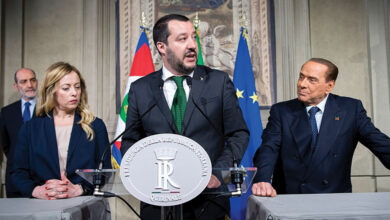Labour: ruling partners?
 The Labour Party’s rising popularity could make it the king-maker in a future Dáil with the chance to work through its policy ideas in government. eloas looks at some of Labour’s policies across key sectors.
The Labour Party’s rising popularity could make it the king-maker in a future Dáil with the chance to work through its policy ideas in government. eloas looks at some of Labour’s policies across key sectors.
Education
Disadvantages in the education system exist particularly at primary and pre-school level and the party believes that rather than cutting spending in schools, finances allocated to education should be ring-fenced for specific improvements.
To relieve some of the training-related pressure on training and employment authority FÁS, Labour suggests increasing the number of vocational subject places available in institutes of technology and further education colleges.
Local councillors should establish local education forums which it hopes will allow for discussion between councillors, school boards, parents and council officials, and to plan for the needs of schools in each area.
Councillors will also promote more playgrounds, walking and cycling to school, as well as ‘night basket’ and ‘night football’ for teenagers. RTÉ would be required to provide periods of children’s programming with no advertising and commercial advertising in schools would be restricted. State ownership of schools is also advocated.
Finance
The party’s ‘Strategy for Stabilisation and Growth’ document advises the Government to restore confidence through a “medium-term fiscal stimulus framework”.
That framework, it says, should have the emphasis on returning to order of the public finances within “three or four years”. It points out that the revised Stability and Growth Pact – an agreement between EU states on fiscal policy – makes allowance for a higher deficit of the 3 per cent of GDP mark in ‘exceptional and temporary’ circumstances. Ireland’s current situation, it says, would certainly fall into that area.
It also advises that the Government should adopt an upper debt to income ratio ceiling.
A performance review of the Irish Central Bank and Financial Regulator, looking back over the last five years, is also proposed. In general, Labour also wants stronger international financial regulation as explained, for example, in the ‘Rasmussen Report’ penned by the Party of European Socialists.
Temporary bank nationalisation is preferred as a less expensive option than the National Asset Management Agency. Labour would extend the public’s freedom of information rights to cover public bodies involved in financial policy.
The party sees Dublin as the main engine of economic growth in Ireland and also the engine of recovery.
Health
If anything, Labour’s critique of the Government’s health policy is even stronger than Fine Gael’s with current reforms described as a “very expensive sham”. The wages of “gurus” and “spin doctors” in the Health Service Executive are contrasted with those of front-line workers. In the party’s view, this is part of a culture of greed and it also opposes cutbacks in smaller hospitals.
Public provision of health services is emphasised and the party has previously proposed universal health insurance. On women’s health, it supports cervical cancer vaccination and wants to see universal screening for the condition for all women over 25 years. Extra support for women in their employment, childcare and family lives is proposed – to help manage stress.
Economy
Despite the Celtic Tiger decade, Labour points to the continuing inequalities in Irish society, which make the economy crucial in making society fairer.
Sustainable economic prosperity depends on new business start-ups and investment in infrastructure, through a revised National Development Plan, rather than over-reliance on property taxes. Science and technology are seen as having a central role.
‘Labour’s New Deal: Key Proposals for Economic Recovery’ – published last September – proposes major school building, house building and insulation programmes to stimulate the construction sector.
Re-training of jobless people, to prevent long-term unemployment, is a priority.
‘Just the Job’ – an employment paper brought out in April – suggests exempting employers from paying their share of pay-related social insurance (PRSI) for 18 months when they create new jobs or take on someone who has been unemployed for more than six months.
With many companies facing a cut to a three day working week, Labour has put forward an ‘earn and learn’ scheme which it says would allow employees to combine work, for three days, and education training for two days. It sees a role for FÁS or an institute of technology in helping with that training.
Justice
Calls have been made for mandatory sentences to be introduced for those found in possession of illegal guns.
It was also put forward that the evidence of a Garda superintendent should be sufficient to obtain a conviction in gun crime cases in order to prevent the intimidation of witnesses.
The party’s 2009 conference in March signalled support for liquor licensees to extend their licences as late or as early as the owner sees fit. This is due to people working later and longer hours and as such, capping drinking hours is viewed as an unjustifiable and unnecessary hindrance for those workers.
Governance
The 21st Century Commission, on the party’s future, reported in February with the words: “For the Irish left, republicanism is not about opposing British monarchs or about territorial claims. Republicanism is of course very much about the traditional values of liberty, equality and fraternity.”
Money should not buy access to power, its ‘Never Again’ plan for ethic states. Spending limits on all elections and strict limits on political donations are demanded; €2,500 to parties and €1,000 to candidates. Dáil investigations could take place into any government decision or any public service.
A new tier of strategic city or regional authorities is proposed, to make local government more powerful. Mayors would be directly elected in every major city or city-region.
All public bodies would be covered by the Freedom of Information Act by default.





